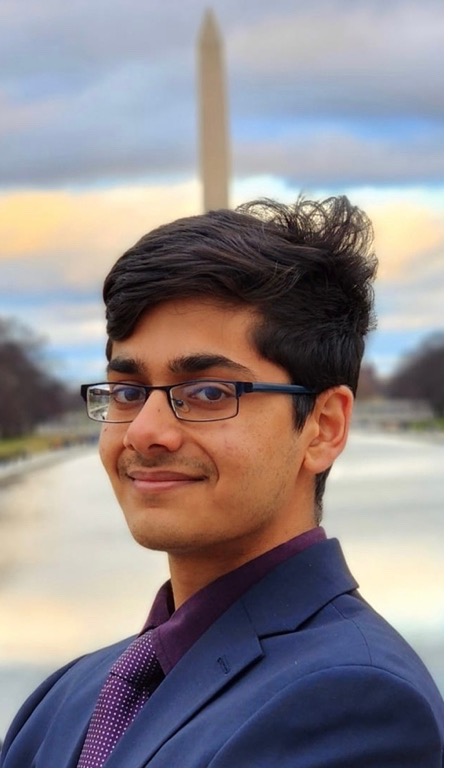Ishir Sharma WSE '25
Student Ambassador Spotlight
 Ishir Sharma is a junior at Johns Hopkins University majoring in Biomedical Engineering with a focus on Imaging & Medical Devices, and an incoming Master’s student at the Johns Hopkins Centre for Bioengineering Innovation & Design.
Ishir Sharma is a junior at Johns Hopkins University majoring in Biomedical Engineering with a focus on Imaging & Medical Devices, and an incoming Master’s student at the Johns Hopkins Centre for Bioengineering Innovation & Design.
Ishir is a GKII Student Ambassador and member of GKII’s JHU India One Hop Mentoring Group
What have you gained as a WSE student at JHU? Can you share a few of your favorite courses, projects where you learned the most, or experiential learning opportunities you’ve participated in through JHU?
As a Biomedical Engineering (BME) student at Hopkins, one of my favorite aspects of the WSE curriculum is the design team program. As a team player, design teams have been an integral part of my BME experience. Having learned in a team environment, I have worked on addressing various clinical problems, from optimizing robotic surgery education to innovating frugal technologies for breast cancer diagnosis. From problem framing to field research to ideation, sketching, and hands-on prototyping, my experience with undergraduate design teams at Hopkins has sparked a flare for med-tech innovation with a closely-knit team of engineers. Thanks to these eye-opening experiences, I am now pursuing my Master’s degree in Bioengineering Innovation and Design at the Johns Hopkins Centre for Bioengineering Innovation and Design (CBID). I am thoroughly excited by the road that lies ahead!
In your opinion, what makes JHU’s engineering program stand out compared to other schools?
As a WSE student, there are numerous opportunities to pursue your passions within the Hopkins community and beyond. From access to a great medical institution to mentorship by fantastic researchers and availability of cutting-edge resources, Hopkins has it all for those passionate about engineering, healthcare, or both. Personally, I have always been interested in global health and working to solve healthcare challenges globally. Through the WSE’s Vredenburg Travel Fund, I was afforded the opportunity to gain invaluable global health experience. Over the summer, I had a life-changing experience in Uganda that further spurred my interest in medical devices. “It’s never the device itself. It’s the way that it interacts with users that makes it either very useful or totally unusable.” The words of a medical officer rang loud and clear in my ears during my clinical rotation at a Ugandan health center. During the summer, I had been volunteering as a field clinical engineering technician in Mbarara, Uganda, focusing on medical device repairs and maintenance. It is these unique opportunities that make WSE unique.
How have you navigated cultural differences in the U.S. and built connections with local and international students from India at JHU?
Joining clubs was a huge part of my introduction to the Hopkins ecosystem. To build a sense of culture, I joined the Hindu Students Council and attended events organized by the International Students at Hopkins. These groups helped bridge my home culture and the Hopkins community. I always seek opportunities to engage with those around me to drive impact through leadership. As a Co-President of the Hindu Students Council, I organize and lead Hopkins’ largest cultural community events on campus each year, with over a thousand attendees, including President Ron Daniels. Such festivities bring a vibrant sense of culture and camaraderie amongst the Indian community and diaspora on campus. Additionally, through the Gupta-Klinsky India Institute at Hopkins, I have been fortunate to work with the team on scaling undergraduate student engagement and providing a platform for Hopkins-India interest amongst our student body.
What advice would you give to your past self or to incoming international students from India?
Every year, several international students make their way into the Hopkins community-a true melting pot of cultures and backgrounds. That is genuinely what Hopkins is- a melting pot of people from all over the United States and from across the world. For me, being at Johns Hopkins has been as much about being a resident of the United States as being an engineering student. In my experience, it is essential to make a solid effort to network and connect with as many individuals as possible from the very start of your time here- peers, professors, faculty, staff, alums, and everyone around you. That would be my single piece advice to international students from India who are entering Hopkins. This will pay off educationally, professionally, and, most importantly, socially. Hopkins is truly an exceptional place with the brightest minds and most exceptional individuals in the world. All that’s left is to contribute to this community and make the most of it!
In what ways has pursuing your education with JHU influenced your personal growth and perspective on the world?
The Hopkins experience has undoubtedly been one of many flavors. As an engineer, I came to Hopkins expecting to learn technical skills pertinent to engineering. However, after I began my journey here, I realized how multidisciplinary and hands-on the education at JHU can really be. As a history buff, I got to explore my interests in a broad range of classes covering the history of science, medicine, and technology, which put into perspective current medical innovations. Outside of class, I had the opportunity to pursue projects, jobs, research, volunteering, and clubs. Not only do these extracurricular involvements provide an excellent balance from academics, but they also teach me a lot about myself and those around me, making me feel truly at home here at Hopkins. Becoming involved with the Gupta-Klinsky India Institute (GKII) Team as a GKII Student Ambassador has been a rewarding experience and I recommend all JHU students from India or the Indian diaspora connect with GKII’s like-minded community!